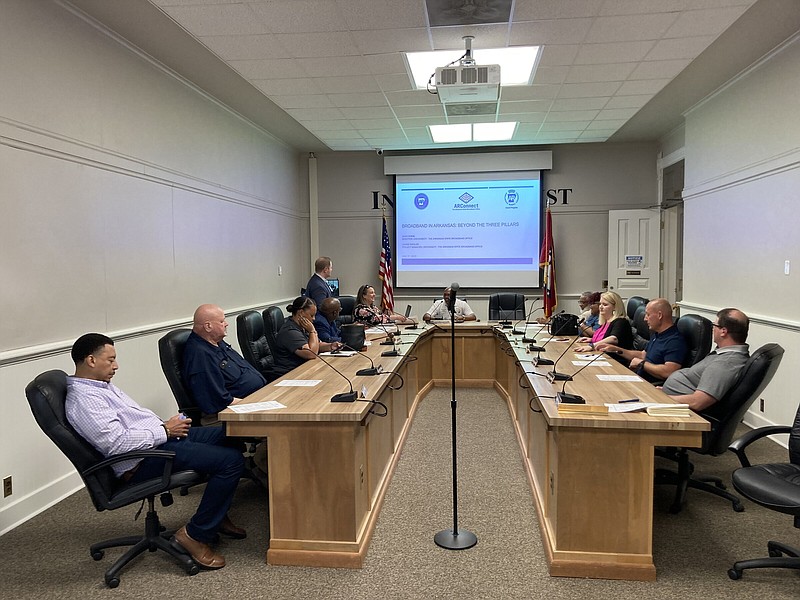Arkansas' goal is to eliminate the digital divide by the year 2028, but getting there is more problematic than installing cell towers and blanketing areas with broadband service, according to Glen E. Howie, director of ARConnect, the state's broadband office.
Howie met with County Judge Gerald Robinson and a variety of others who attended a meeting held recently at the Jefferson County Courthouse with the goal of getting a better idea of what the county's needs are concerning connectivity. Howie said that, other than access, cost to a resident was also a factor as well as that resident's ability -- or desire -- to use the necessary technology to access the internet.
"Access is foundational," Howie said, " but we have to think more broadly and attack all three pillars at the same time."
Howie, who was accompanied by Laurie Ringler, broadband project manager with ARConnect, said the state defines broadband, or high-speed internet, as a signal with transmission speeds of at least 100:20 megabits per second. Based on that criteria, he said, close to 270,000 locations in the state do not have access to broadband. In Jefferson County, there are 10,300 locations that either don't have access or the maximum internet speed they do have access to is below the state's minimum.
As for affordability, which is considered $50 a month for broadband service, 18,000 households in Jefferson County qualify for assistance through the Affordable Connectivity Program, but only about 5,700 households have enrolled in the program.
Howie said his office estimates that as many as 275,000 Arkansans between the ages of 18 and 64 do not have the digital skills necessary to take full advantage of broadband. In Jefferson County, there are some 7,200 such individuals, he said.
The state has made progress over the years, Howie said. A billion dollars from various types of grant awards has been awarded to expand internet availability to about 330,000 locations in Arkansas. Across the state, 137,000 households have enrolled in the Affordable Connectivity Program, with more than 600,000 others who could enroll but haven't.
Howie told the story of a man in a rural part of the state who called regularly wanting to know if he was closer to getting connected to the internet. The man, Howie said, could see from his house several workers installing lines and was hopeful he would be next. The problem, Howie said, is that based on a variety of factors, someone across the street from the man might get the internet tomorrow and the man who is calling might not get it for six years.
"That's how complicated this stuff is," he said.
Availability problems exist even in the Little Rock area where there is less than 100% coverage.
"So we have work to do everywhere," Howie said. "It is truly a statewide problem."
The problem with not having access to the internet is multifaceted. During the pandemic, when students had to study from home, it was an often-told story that described students, who did not have access to internet at home, sitting in the parking lots of restaurants using the businesses' wi-fi signal to do their homework, said Solomon Graves, director of public policy at Heartland Forward, a nonprofit whose goal is to increase the productivity of the middle portions of the country.
Graves said a lack of connectivity means getting left behind.
"This is an economic development issue," he said. "This is a quality of life issue."
Without access to high-speed internet, Graves said, "people will be shut out of the economic development in the 21st century. That is not the world we should be living in."
Heartland Forward is helping ARConnect reach its statewide goals. To that end, Heartland Forward is asking counties to complete a needs survey that addresses several areas such as the number of households at or below 150% of the poverty level, the number of people who are 60 years of age or older, the number of incarcerated people living in the county, the number of people living in rural areas and the number of people who are associated with racial minorities.
Howie said that, across the state, close to 90% of Arkansans fit into one or more of those categories.
"We have a tall task in the state," he said.
The program for erasing digital disparities in the state, like the high-speed internet officials are pushing, will be moving along quickly, with deadlines across the next several months for establishing the plans for what each county needs. Much of that planning will fall to Robinson, who said after the meeting that he was excited about getting the work in motion. He said he would establish a planning committee made up of 15 members from a variety of categories, as well as working with vendors, such Cablelynx Broadband and Ritter Communications, that will help establish high-speed internet across the county.
"We will have a wide swath of stakeholders representing many areas such as education, public service, literacy and business," Robinson said. "I look forward to getting them in place and getting started."
